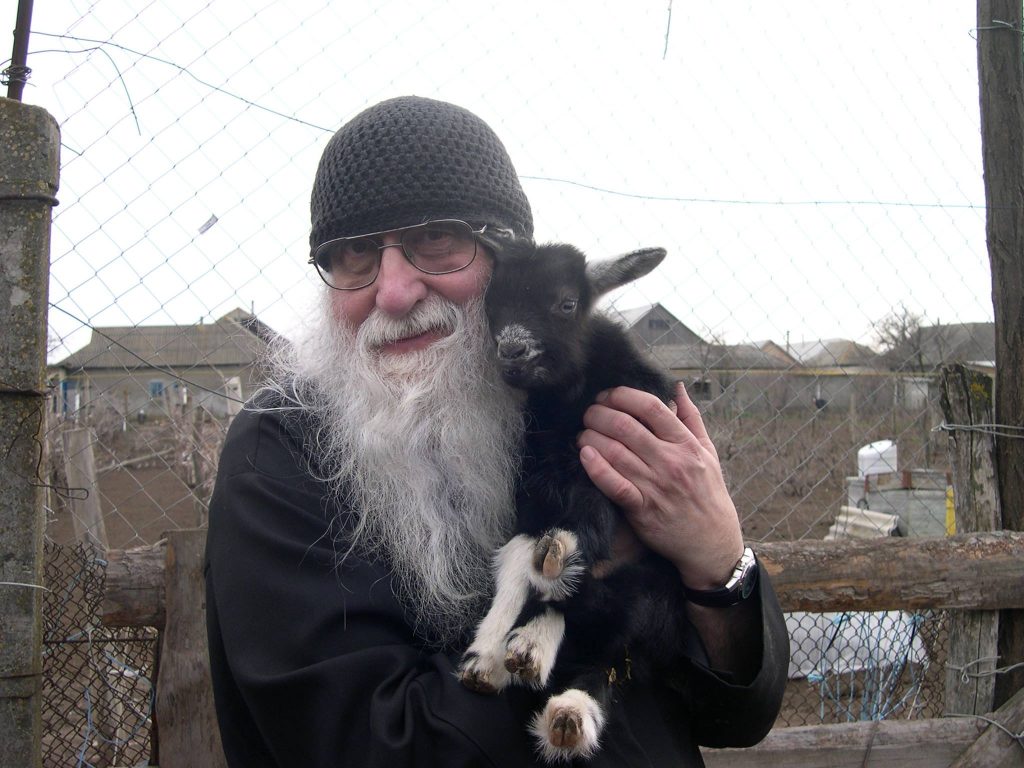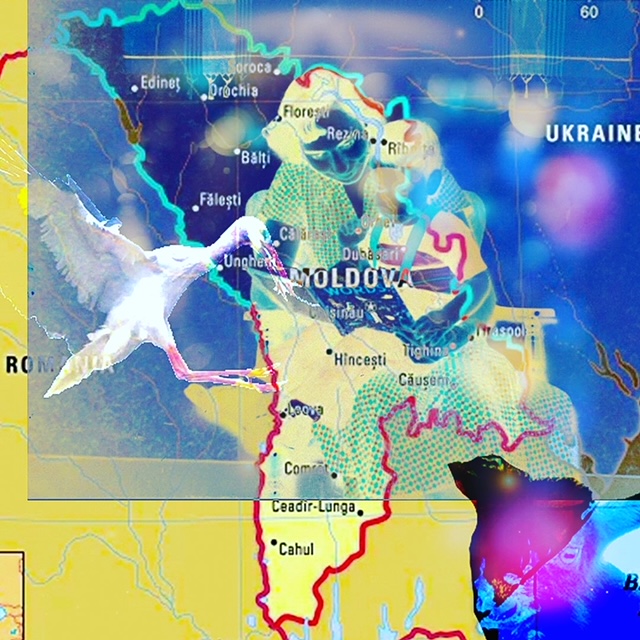
Cosmas Shartz
Cosmas Shartz is an Orthodox Christian monk living in the Autonomous Territorial Unit of Gagauzia, in the southern part of Moldova, in Eastern Europe, helping to translate church services and spiritual literature into the Gagauz language. He writes a lot of fiction which is read only by a handful of people, but perhaps his best-known work is a piece of non-fiction, A Little English-Gagauz Conversation Guide.
- What kinds of writing do you write?
- I write several different kinds of things — essays, poetry, little stories, novellas, and novels. I make a point of writing in a wide variety of styles and idioms, everything from science fiction to detective stories to tales of the old West, ranging from realistic to surrealistic, sometimes in the style of fairy tales or parables. I should add that almost all of my writing is in a language you have probably never heard of, Gagauz, which is one of the minor Turkic languages, spoken by only about 1.25 million people, but which I use everyday here where I live, in the Autonomous Territorial Unit of Gagauzia, in the southern part of Moldova, in Eastern Europe. It isn’t my native language — I’m an American, and my native language is English — and one of the reasons I deliberately write in such a wide variety of literary idioms is to stretch my abilities as a writer.
- What’s one of your favorite things you’ve written, and why?
- One of the favorite things I have written is a novella that plays with the literary theme of the “double,” in which two characters, a hermit monk and a murderer on the run from the law, agree to trade lives, with the monk turning himself in and being given the death penalty, while the murderer takes on the role of monk and unexpectedly finding release from his guilt and self-loathing. If it’s all right for me to mention another piece of my writing that I especially like, I’d add another novella, Sarah Pushkin. The name of the novella and the name of the main character sound suspiciously like someone we know, don’t they? Sarah Pushkin is a mysterious woman, possibly an ex-spy, perhaps even a double or triple agent, who might be British, might be Russian, might be French or American, or perhaps she has ancestral roots among the peoples of the Altai Mountains in the far reaches of Siberia, where she spends some time recovering from wounds in a gun battle, and is mystically initiated into shamanism, acquiring the ability to communicate with animals, who then come to her assistance in her further adventures as she breaks up a criminal ring engaged in human trafficking and killing people to harvest their organs for sale on the black market. That novella was a lot of fun to write, and was published in book form here a couple of years ago.
- What’s something you wrestle with in your writing process?
- What do I wrestle with in my writing process? That’s an easy question to answer — the fact that I am writing in a foreign language which does not have the resources available that would make it convenient. For example, there is no Gagauz-English / English-Gagauz dictionary. I use a Romanian to Gagauz dictionary (having to use an English to Romanian dictionary first to get the correct Romanian word), but I also “crowd-source” a lot of vocabulary, putting a photo or short video on social media and asking native speakers for the word. This is an enjoyable process, especially when there isn’t already a word available in the language and my Gagauz-speaking friends (most of whom speak no English at all) discuss among themselves the various solutions. Once I needed a word for “escalator,” and we settled on coining a word that literally means “moving staircase.” Since this language has a very short literary history — it didn’t even have its own alphabet until about a hundred years ago — it does not have a wealth of abstract terms. Early on in my efforts to write in it, I made a decision — “I’m probably not going to be able to write like a scientist or a philosopher in this language, but I can write like a poet.” This has given me the self-imposed discipline to express myself as much as possible with vivid concrete imagery, to transform ideas into metaphors, similes, images, allegories, parables, fables, and the like.
- How would you describe your writing process?
- My writing process varies according to whether the piece underway is short or long. I sometimes write some of my short works — tales or poems — in one sitting. In the case of a novel or a novella, I often begin with notes about how I want it to go. I have a special file reserved for this. The next step is to make a tentative summary of the main lines of the action, in one long paragraph. The following step is to expand that paragraph, dividing it into chapters. I do this in the form of two separate files, always writing up a structural outline in two parallel forms, one in English, one in Gagauz. I work on the two files side-by-side, and have no preference as to which gets the new ideas and developments first. I try to bring this outline to a point where it is several pages long, with a good long paragraph for each chapter. Then I create empty files for each chapter, and copy / paste the summary for that chapter into each appropriate file. I have a novella underway right now which is just at that stage, and I have created forty-two empty files. As soon as I work on the outline a little more, I will paste the summary into each file. At that point, I begin expanding each of the chapter summaries to create actual chapters. I go back and forth from one chapter to another, over and over and over, so that the work as a whole grows uniformly, rather than attempting to put chapter one into complete form, then chapter two, then chapter three, and so on. My approach is always to see the whole work as a whole work from the very beginning.
- “Hardware” tell-all; for example: Microsoft Word or Google Docs or paper forever? Legal pads or note cards or backs of envelopes? Pencils or pens? No. 2s or mechanical? Bics or Montblancs? Etc.!
- I write in Microsoft Word, but I often make notes in pen on paper. I use a special size of paper for the purpose, A4 size (a metric size which is close to the size of American “letter size” paper), torn in half, putting them on a piece of composition wood that’s like a clipboard with no clip. My favorite pen is a PaperMate Profile, but I am running down to the end of my supply (in the past I have stocked up on things like this on trips to the US, but my last trip to American brought me back here just before the pandemic hit, so before long I will have to buy pens that are available here).
- A standout feature of your actual desk or virtual desktop that you rather like?
- I suppose a standout feature of my virtual desktop is toggling back and forth between various windows as I write. Before I undertake the actual writing, I accumulate material that I plan to use. For example, in the novella I mentioned about the hermit monk and the murderer who trade lives, I had decided that the murderer would be a big Beatles fan, so before I even started the structural outline, I made a list of song titles and pieces of lyrics which I translated into Gagauz so that they would be ready when I got to the writing, I could go back to the file of notes, where I had already translated things like “I am the egg man, I am the walrus,” ready to use.
- 3 adjectives that describe that ‘writerly feeling’ when you’re in the zone?
- joyful, surprising, delightful
- 3 adjectives that describe that ‘not so writerly feeling’ when you’re hitting a wall?
- I’m afraid I don’t have any adjectives that describe a “not so writerly feeling” on hitting a wall, because it doesn’t ever happen for me. If it looks as though an idea isn’t going to pan out, I abandon it pretty early in the process, so that I don’t have the experience of beginning and then getting stuck.
- What is your Writing Animal Guide (whatever that means to you!) and why?
- When I first thought about how to answer this question — “What is your Writing Animal Guide?” I was stumped. I ran through several different animals in my mind, and rejected each one. Then it occurred to me that my writing animal guide is probably the little guy in the profile photo I’m using — a baby goat. Yes, that fits. It may be the influence of the baby goat (the baby goat in the photo was only a few hours old) that gives my writing its quality of playfulness.
- What’s your top piece of writing advice for grad students embarking on their dissertations?
- My top piece of writing advice for graduate students embarking on a dissertation is to try doing what I do in getting started on writing a novel or a novella. Very early on, long before your dissertation is due, begin to put together an outline of the whole thing, always keeping in mind that you can keep changing it as you go along. But then use that outline, broken down into chapters, as a set of suggestions for papers to write for classes, to submit to journals, to present before any audience that will allow you to inflict your ideas on them, so that by the time you get ready to get down to work on the dissertation itself, you already have a mass of draft material you have accumulated and have tested out on audiences and readers. If you read through the front matter of almost any published nonfiction book — a far better practice than skipping over it and going straight to the first page of the text itself! — you see that it is composed of material that was already written and published previously. Create a framework for yourself early on in your graduate studies to do the same thing.
